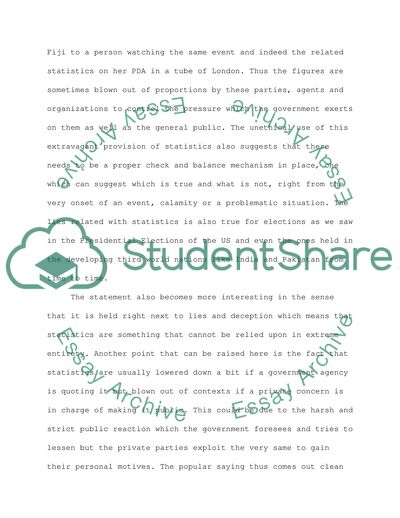
- Home
- Free Samples
- Premium Essays
- Editing Services
- Extra Tools
- Essay Writing Help
- About Us
- Studentshare
- Subjects
- Miscellaneous
- There are lies, damn lies and statistics
There are lies, damn lies and statistics - Essay Example

- Subject: Miscellaneous
- Type: Essay
- Level: Undergraduate
- Pages: 4 (1000 words)
- Downloads: 0
- Author: yundtelaina
Extract of sample "There are lies, damn lies and statistics"
They are a fabricated lot, one that stems out from the thinking of different individuals who are either present or at times absent on the spot of the event, calamity or the natural tragedy that has taken place. Statistics usually shape up the importance of an event, a situation or a problem that we are delving into. The statement holds more basis in the fact that it is a thought of a person who is shaping up a story so that a particular newspaper gets more copies sold or a television channel gets more airtime from the different viewers, which could be a broad cross-section of societies, from someone living in Fiji to a person watching the same event and indeed the related statistics on her PDA in a tube of London.
Thus the figures are sometimes blown out of proportions by these parties, agents and organizations to control the pressure which the government exerts on them as well as the general public. The unethical use of this extravagant provision of statistics also suggests that there needs to be a proper check and balance mechanism in place, one which can suggest which is true and what is not, right from the very onset of an event, calamity or a problematic situation. The lies related with statistics is also true for elections as we saw in the Presidential Elections of the US and even the ones held in the developing third world nations like India and Pakistan from time to time.
The statement also becomes more interesting in the sense that it is held right next to lies and deception which means that statistics are something that cannot be relied upon in extreme entirety. Another point that can be raised here is the fact that statistics are usually lowered down a bit if a government agency is quoting it but blown out of contexts if a private concern is in charge of making it public. This could be due to the harsh and strict public reaction which the government foresees and tries to lessen but the private parties exploit the very same to
...Download file to see next pages Read MoreCHECK THESE SAMPLES OF There are lies, damn lies and statistics
A Feasibility Study of Building Structural Deformation Monitoring using Global Positioning (GPS)
Advertising:the art of convincing people to spend money
Current Issues in Advertising
Antibiotics as Growth Hormones in Meat Production
Global Warming Debates
Financial Mathematics and Business Statistics
Comparison of Two Crime Reduction Strategies
Civil Part Australian Council of Projection Deans

- TERMS & CONDITIONS
- PRIVACY POLICY
- COOKIES POLICY